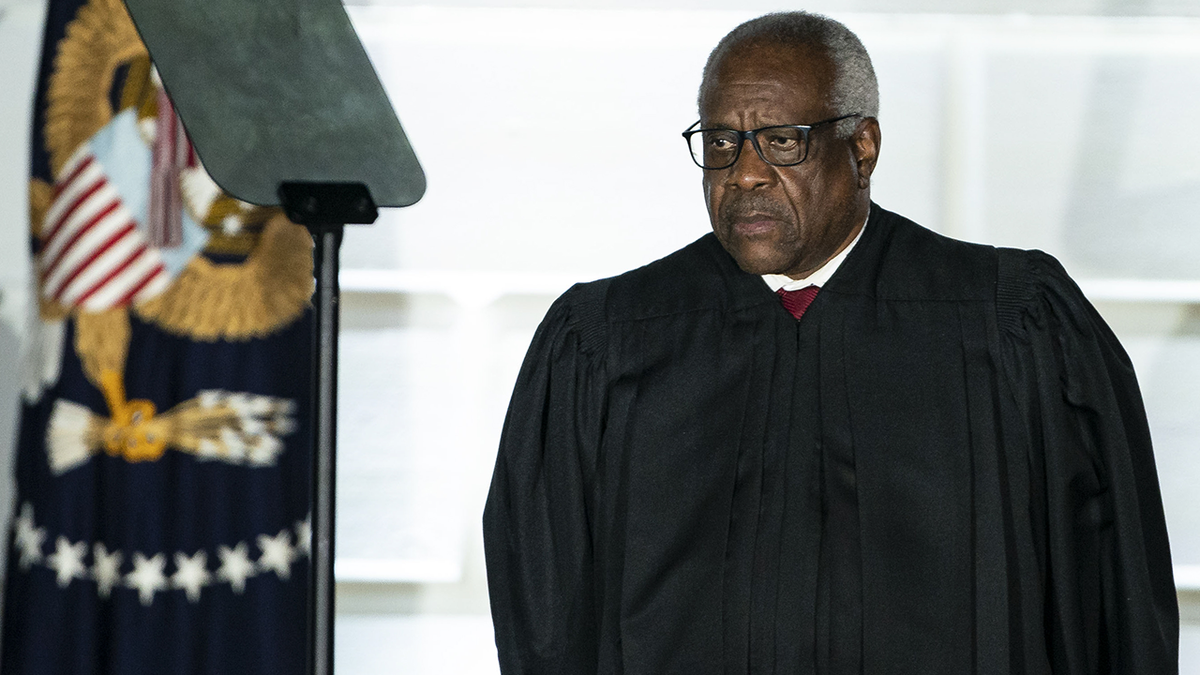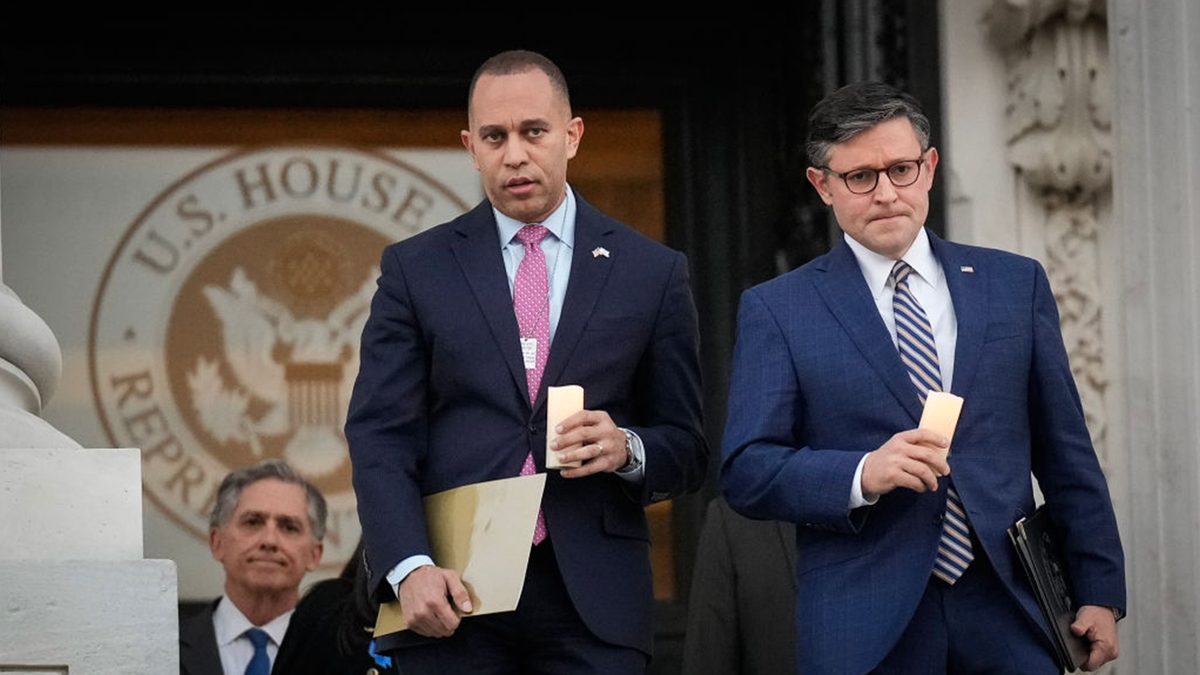
Justice Clarence Thomas, in the court’s latest decision upholding a GOP-drawn redistricting map in South Carolina, took aim at a key, decades-old civil rights decision, calling it an ‘extravagant [use] of judicial power.’
On Thursday, the Supreme Court sided with the Republican-led South Carolina legislature after it was challenged for alleged racial gerrymandering in drawing new redistricting maps.
In a 6-3 decision, written by Justice Samuel Alito, the high court said that ‘a party challenging a map’s constitutionality must disentangle race and politics if it wishes to prove that the legislature was motivated by race as opposed to partisanship. Second, in assessing a legislature’s work, we start with a presumption that the legislature acted in good faith.’
In a concurring opinion, Justice Thomas wrote that the 1954 decision in Brown v. Board of Education – written by his predecessor, Justice Thurgood Marshall – introduced an ‘extravagant [use] of judicial power.’
The Brown decision said that separating children in public schools on the basis of race was unconstitutional, and overruled the ‘separate but equal’ legal doctrine.
Thomas, who grew up in the segregated South, has repeatedly stated that the Constitution prohibits race-based discrimination, regardless of the intent, and its devastating effects.
In the case last year banning affirmative action in college admissions, Thomas wrote a concurrence ‘to offer an originalist defense of the colorblind Constitution’ and to ‘clarify that all forms of discrimination based on race — including so-called affirmative action — are prohibited under the Constitution; and to emphasize the pernicious effects of all such discrimination.’
‘Individuals are the sum of their unique experiences, challenges, and accomplishments,’ he said. ‘What matters is not the barriers they face, but how they choose to confront them. And their race is not to blame for everything — good or bad — that happens in their lives.’
In 1995, Thomas wrote a lone concurrence in the case of Adarand Constructors, Inc v. Peña, stating that the government’s ‘benign discrimination’ that tries to help racial minorities who are ‘thought to be disadvantaged’ is another form of invidious ‘racial discrimination, plain and simple.’
Thomas’ point in his concurrence in the case decided Thursday is that federal courts are not qualified to determine how voting maps are designed.
‘The Constitution provides courts no power to draw districts, let alone any standards by which they can attempt to do so,’ he said.
‘And, it does not authorize courts to engage in the race-based reasoning that has come to dominate our voting-rights precedents. It is well past time for the Court to return these political issues where they belong — the political branches,’ he said.
Thomas said that ‘the Court once recognized its limited equitable powers in this area.’ The federal courts have the power to grant either legal remedies, such as monetary damages, or equitable remedies, such as compelling or prohibiting a certain act.
‘We previously acknowledged that ‘[o]f course no court can affirmatively re-map [a State’s] districts so as to bring them more in conformity with the standards of fairness for a representative system. At best we could only declare the existing electoral system invalid.’’
But he said that the Brown decision – which was decided 70 years ago almost to the day of Thomas’ concurrence – introduced ‘[t]he view of equity required to justify a judicial mapdrawing power.’
‘The Court’s ‘impatience with the pace of desegregation’ caused by resistance to Brown v. Board of Education ‘led us to approve…extraordinary remedial measures,” he said.
Thomas explained that in the follow-up case to Brown, the Court considered ”the manner in which relief [was] to be accorded’ for vindication of ‘the fundamental principle that racial discrimination in public education is unconstitutional.’
‘In doing so,’ Thomas wrote, ‘the Court took a boundless view of equitable remedies, describing equity as being ‘characterized by a practical flexibility in shaping its remedies and by a facility for adjusting and reconciling public and private needs.”
‘That understanding may have justified temporary measures to ‘overcome the widespread resistance to the dictates of the Constitution’ prevalent at that time, but, as a general matter, ‘[s]uch extravagant uses of judicial power are at odds with the history and tradition of the equity power and the Framers’ design,’’ he said.
‘Ultimately, to remedy racial gerrymandering or vote dilution, someone must draw a new map. I can find no explanation why that ‘someone’ can be a federal court [and not the state legislature],’ he said.
Thomas went on to say that the Supreme Court’s jurisprudence in redistricting matters ‘puts States in a lose-lose situation.’
He referenced the Court’s decision last term that ruled in favor of Black voters in Alabama challenging the state’s GOP-friendly congressional map, which the court’s majority found to be likely in violation of the Voting Rights Act. The VRA prohibits voting practices or procedures that discriminate on the basis of race.
But Thomas and two of his colleagues dissented, saying, ‘The question presented is whether [Section 2] of the Act, as amended, requires the State of Alabama to intentionally redraw its long-standing congressional districts so that Black voters can control a number of seats roughly proportional to the Black share of the State’s population. Section 2 demands no such thing, and, if it did, the Constitution would not permit it.’
Thomas, in his concurrence Thursday, argued that, ‘Taken together, our precedents stand for the rule that States must consider race just enough in drawing districts.’
‘And, what ‘just enough’ means depends on a federal court’s answers to judicially unanswerable questions about the proper way to apply the State’s traditional districting principles, or about the groupwide preferences of racial minorities in the State,’ he said.
‘There is no density of minority voters that this Court’s jurisprudence cannot turn into a constitutional controversy. We have extracted years of litigation from every districting cycle, with little to show for it. The Court’s involvement in congressional districting is unjustified and counterproductive,’ he concluded.








